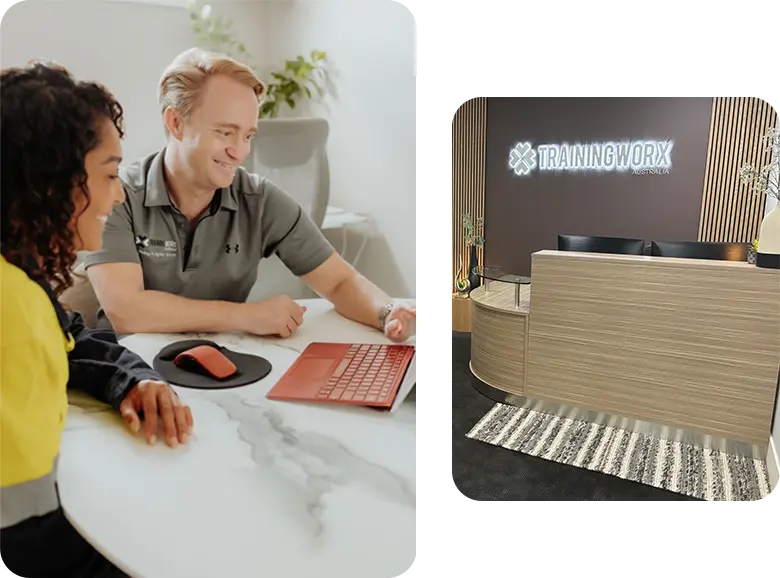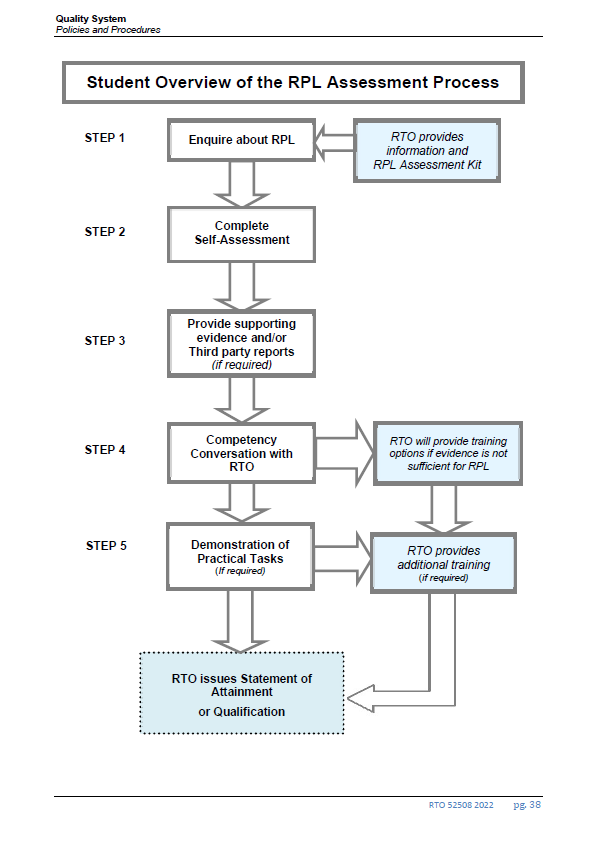
Recognition of
Prior Learning
Training Worx will offer recognition of prior learning (RPL) to individual students to enable the competencies they have acquired through formal, non-formal and informal learning to be recognised where these align to the units of competency in which students are enrolled.
Responsible Person / Authority to Change: Chief Executive Officer
Link/s to Regulatory Requirements: Standards for RTOs 2015: Clause 1.12.
Definitions:
Recognition of Prior Learning (RPL) means an assessment process that assesses the competency/s of an individual that may have been acquired through formal, non-formal and informal learning to determine the extent to which that individual meets the requirements specified in the Training Package or VET accredited courses.
a) formal learning refers to learning that takes place through a structured program of instruction and is linked to the attainment of an AQF qualification or Statement of Attainment (for example, a Certificate, Diploma or University Degree);
b) non-formal learning refers to learning that takes place through a structured program of instruction, but does not lead to the attainment of an AQF qualification or Statement of Attainment (for example, in house professional development programs conducted by a business); and
c) informal learning refers to learning that results through experience of work-related, social, family, hobby, or leisure activities (for example the acquisition of interpersonal skills developed through several years as a sales representative).
Procedure:
1. Recognition of Prior Learning Enquiry
Prior to enrolment or commencement of training, whichever comes first, Training Worx will provide information to students about the RPL assessment process. Information about RPL will also be maintained on Training Worx website to encourage those considering enrolment with Training Worx to enquire about RPL. Once a request for RPL is received Training Worx will provide a RPL Assessment Kit which has been designed to walk students through the process and guide them on the evidence required to support their application for RPL. If not yet enrolled, an enrolment form will also be provided.
2. Self-assessment
RPL applicants will complete a self-assessment against the requirements of the units of competency for which they are seeking recognition. This involves identifying the sort of work or activities undertaken with an indication of how frequently and how recently this has occurred. The self-assessment will be submitted to Training Worx with supporting evidence.
3. Supporting evidence
The RPL Assessment Kit will guide applicants in the types of evidence they can provide to support their claim for recognition. Evidence may include documents such as:
- memberships of voluntary, professional or industry associations
- hobbies/interests/special skills outside work that relate to the training course
- references/letters from previous employers/supervisors/volunteer organisations
- awards for voluntary services
- brief résumé or Curriculum Vitae (CV)
- certificates and records of results
- licences and tickets, eg forklift, crane
- industry awards
- authenticated photographs of work or projects undertaken
- work diaries/task sheets/job sheets/logbooks
- site training or competency records
- third party reports that relate specifically to the units of competency for which recognition is sought
- any other documentation that may demonstrate experience or support a claim for RPL.
4. Competency conversation
Once the application and supporting evidence have been submitted to Training Worx, an assessor will be assigned who will conduct a systematic review of the documentary evidence and arrange a face-to-face meeting for the purpose of gathering oral evidence from the applicant in relation to the skills and knowledge required by the units of competency. An outcome of this process may be that in the assessor’s judgement the evidence is not sufficient to achieve recognition and if no further evidence is available, training options will be provided to the applicant. If required by the units, the next step is a practical demonstration of required performance by the applicant.
Demonstration of practical tasks
The assessor will observe the applicant undertaking practical assessment tasks required by the units of competency. If performance does not meet the standard required by the units, the applicant will be provided with options for gap training to address those aspects not demonstrated.
Award of Statement of Attainment or Qualification
Once all requirements have been met, a Statement of Attainment will be issued to reflect the units achieved. If all units in a qualification have been achieved through RPL, a qualification and record of results will be awarded. RPL flowchart of the process.
The flowchart below provides an overview of the RPL assessment process from a student perspective.

